Toddler biting solutions from real parents and teachers. In this article, we address toddler biting behaviour – why toddlers bite, how to handle it, and ways to put an end to toddler biting at home and daycare.
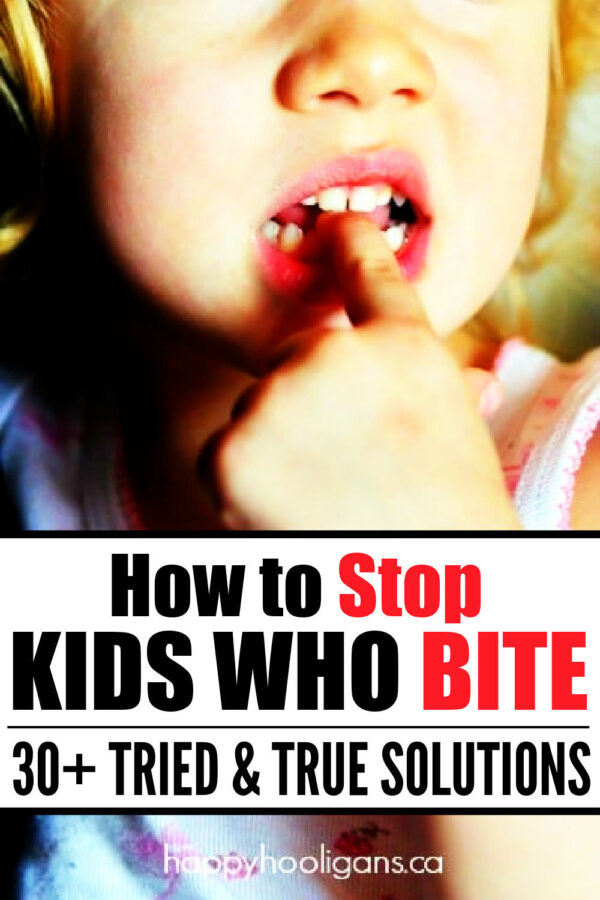
You’ve know the scene – the kids are playing nicely while the parents chat nearby, when all of a sudden, (horrors!), your toddler bites someone. Or maybe it’s your toddler who’s been bitten by another child. Regardless, when one child bites another child, there will be tears, concern and upset parents as well as upset children.
Is it normal for toddlers to bite?
Yes, absolutely, but if your child is a biter, you need to do something about it before someone really gets hurt. If the biting behaviour continues, other parents and kids may start to avoid your child, or at the very least, they’ll be on-guard when he or she is nearby.
But how do you teach toddlers to not bite?
Before we dive into the things you can do to stop the biting behaviour, it helps to understand WHY toddlers bite. There are a number of different reasons to explain the behaviour.
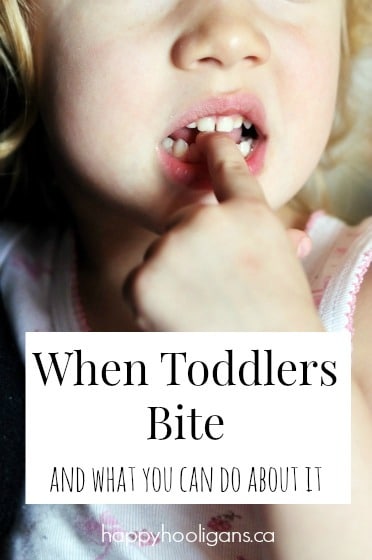
Why do toddlers bite?
- Toddler biting can be an emotional response. Maybe your toddler bites when excited or angry. Perhaps they bite when frustrated or tired or hungry. There are all kinds of emotions that can trigger impulse biting behaviour.
- A young child is often innocently experimenting and testing his body’s capabilities when they bite. Biting is only natural when you have a new set of teeth to try out.
- A child with limited communication skills may bite as a means of expressing himself.
- Biting can be a means of attention-seeking. It certainly gets an instant response from the victim and any near-by adults.
- Biting can be related to Sensory Processing issues. A child with SPD needs the oral stimulation and gratification that biting provides. Learn more about SPD here.
Real Advice from Real Parents and Care Providers
Recently, I posted the following parenting question on my page, and my followers – parents, teachers, grand-parents and caregivers – were more than happy to share their advice and their tried and true solutions for dealing with a toddler who bites.
“I have a one year old biter in my home daycare. He doesn’t do it out of anger. He just goes up and bites for no reason. I’ve tried offering him a teething ring to chew on instead, but it doesn’t help at all. Whenever he bites, I set him down and say ‘Don’t bite. It hurts our friends’. It happens again as soon as I turn my back for two seconds. What should I do!”
The following suggestions are not based on my own personal experience. This is a compilation of solutions from dozens of parents and carers for whom they’ve worked successfully. Every suggestion will not suit every parent or child.
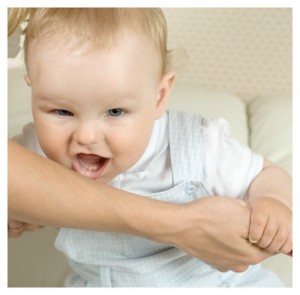
Please take the child’s age and comprehension skills into consideration when using any of these ideas at home or in your classroom.
We earn a commission from sales made via product links in this post.
How to Stop Toddler Biting – Solutions that work!
- Attend to the victim first. The biter should not be the first to receive your attention. The biter will benefit by watching you treat the bitten child with empathy and tenderness.
- Have the biter help the bitten child. He can assist in washing the bite, holding ice on it etc. Point out the bite-marks so he understands the damage his teeth have done.
- Repeat sternly “NO BITING. BITING HURTS.” any time the child bites.
- The biter must sit out for a few minutes to think about his actions while the bitten child returns to play.
- Communicate with meaning: Rather than using the term “time-out”, say “When you bite, you will have to miss out on some play time to think about how you hurt your friend”. To a child, those words hold more meaning than the over-used phrase “time-out”.
- Stop all forms of play-biting at home. Nibbling your child’s fingers and toes sends mixed messages and teaches your child that biting is fun and a way to express affection. It’s only natural that she might try to do the same with her friends or you. Unlike an adult, a toddler cannot distinguish between a bite that’s acceptable and one that’s not.
- Read books that address biting behaviour with your child. “Teeth are Not for Biting” and “No Biting” are two of our favourite books that help to teach kids not to bite.



- Watch a biting toddler closely, and do not leave him or her unattended with other children until the phase passes.
- Have the biting toddler “shadow” the teacher or caregiver until the phase passes. This means the child must stay close to the teacher or caregiver at all times. In a daycare or preschool setting, this means the child will miss some playtime as they will need to accompany the adult while he or she changes diapers, prepares snacks and meals etc.
- Give your toddler lots of undivided attention throughout the day if you feel he or she is biting for attention. A child who doesn’t receive enough will often seek any kind of attention – even the negative kind. Read together, help him do a puzzle, draw together, or ask him to help you with simple tasks like sorting laundry or putting the groceries away. Creating special moments together, and engaging more often with your child can produce quick results.
- Give him a “biting zone” on his own arm. When you catch your toddler biting or about to bite, re-direct him to his own arm.
- Remind him that “teeth are for eating, not for biting people”.
- Provide a pacifier until the phase passes.
- Do some reading yourself. Two suggested books for adults regarding children’s biting behaviour are “No Biting” and “The Biting Solution”.





- Give him a “biting bear”: Tuck a small teddy bear into the top of his shirt, and encourage him to bite it when he feels the urge. Tell him “biting hurts our friends, but it won’t hurt the bear.”
- Listen and sing along to the song “Don’t Don’t Don’t Bite Your Friends!” by Yo Gabba Gabba:
- When a child bites, place your fingers firmly over his or her mouth and say “NO BITING, BITING HURTS”.
- Use positive, affirmative language such as “teeth are for food”, or “keep your teeth to yourself” rather than negative words such as “no biting” and “don’t bite”. When you say “don’t bite”, the child hears “bite”. Think about it: when someone tells you “don’t think of a blue elephant”, what do you think of?
- See a dentist. Often, a toddler’s biting is related to pain, not behaviour.
- Offer crushed ice to bite on and tell the child he or she is allowed to bite on that when the urge hits.
- Offer a chewy toy that you can attach with a tether, to the child’s shirt. Click the image below to see one such product.

More chew toys for kids who bite:
- water bottle with bite valve
- chewable bracelets and necklaces
- soft, freezable, terry teethers
- frozen teethers
- knobby chewing tubes
- an amber necklace
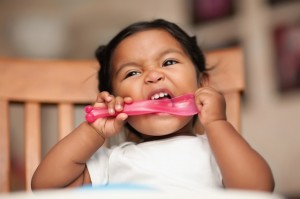
Child Biting Spoon via Shutterstock
- Look for good behaviour, and praise the toddler when you spot it.
- Get down to the child’s level. Kneel on the floor, and make eye contact when speaking to the biter.
- Have the victim explain how he or she feels. This can help teach the biter empathy and compassion.
- Look for patterns in your toddler’s biting. Does she or he tend to bite most often when tired or hungry, when over-excited, or when transitioning from one activity to the next?
- Is the toddler biting out of frustration due to a lack of communication skills? Teaching basic sign language may help. Offer picture books or a collection of simple pictures (food, potty, bed, toys) so he can point out his needs to you.
- Have a go-to phrase to use when the child bites. “I do not bite you, you do not bite me, and WE do not bite others”. Have the child repeat the phrase back to you, and apologize to the child that was bitten.
- Press the child’s arm gently against their teeth, and ask him to describe how it feels. He may not realize just how sharp and and powerful his teeth are.
- Swiftly remove the child from the play area when they bite, and place him/her in a near-by cot or playpen. The biter must stay there until the bitten child stops crying. Make sure there are no toys in the playpen. This is not fun time. It’s time to think about how he/she hurt a friend.
- Make a “biting blanket” – a knotted piece of tee-shirt or a face-cloth that the child can bite on.
- Make a collection of “chewies” – wooden blocks wrapped in fabric or a face-cloth and keep them in a basket where your child has access to them.
- When all else fails, a drop of vinegar or vanilla extract on the tongue can quickly put an end to biting. While vinegar and vanilla taste unpleasant, there are no harmful consequences to tasting either of them. Never use soap or hot sauce regardless of how desperate you are.

In closing…
Most often, when toddlers bite, there’s a reason for it. Oral sensory issues, the inability to communicate, frustration, fatigue etc. Therefore, the solution usually lies, not in punishing the child, but explaining why biting is not acceptable, and by delivering consistent responses and consequences.
If your child is teething or has sensory issues, it helps to understand that his need to bite isn’t bad. He just to satisfy it in a way that doesn’t harm others.
Never bite a child who bites!
It should go without saying that you should never bite a child back in order to “teach him a lesson”. For starters, it is never acceptable to deliberately inflict pain upon a child – not your own child and not another’s. Secondly, biting a child because you’re frustrated with their behaviour only reinforces that biting out of frustration is ok.
There are always gentler, kinder ways to break habits and correct unwanted behaviour.
Hopefully one of the above suggestions helps to solve any toddler biting issues you’ve had with your child at home or at daycare.
Related Posts You May Find Helpful:
- When Your Child Isn’t Settling In At Daycare
- When Your Child Has Trouble Making Friends
- How To Put An End To Sibling Rivalry

Jackie is a mom, wife, home daycare provider, and the creative spirit behind Happy Hooligans. She specializes in kids’ crafts and activities, easy recipes, and parenting. She began blogging in 2011, and today, Happy Hooligans inspires more than 2 million parents, caregivers and Early Years Professionals all over the globe.
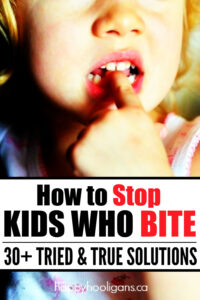
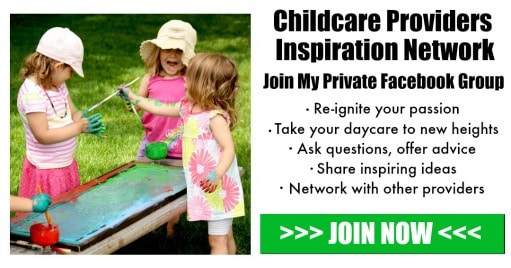

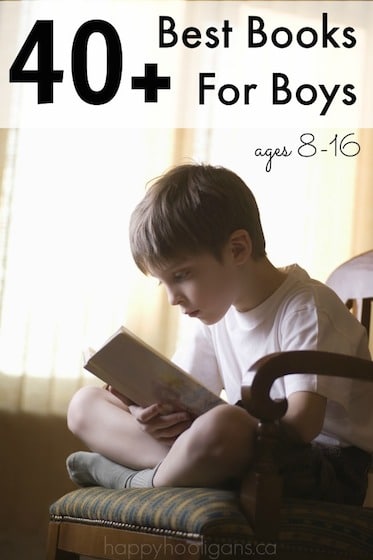





peggy
do you have any advice on trying to potty train a child with a slight austium
happyhooligans
I’m sorry, I don’t, Peggy. Have you tried goggling it?
Dayna @ Lemon Lime Adventures
What a great post. So nice to have all this advice in one place.
Charlotte @ Pirate Monkey Mama
My little guy is a biter but he only bites me or, occasionally, my husband. I really appreciate the tips you’ve laid out here. Some I’d already figured out but I’ll definitely be incorporating more of these now. Thanks for puttng it all in one place.
David Walters
Lots of useful advice here. It is a common problem in a nursery setting. Often it is the same child being bitten and it is difficult for some parents to understand when their own child is the victim and not someone who is a biter themselves. I will share some of these with my staff
Kate Lloyd
Oh Jackie, how I wish this information was available to me when my little girl was going through this stage. Thank you so kindly for such a great post full of great information for parents and carers.
Debfavebie
Telling.them to.bite themselves or giving them a toy or object to.bite Instead is bunch of bull. That is still.promoting biting. Biting.is biting,.they.don’t understand the difference. They get frustrated.cause they have not learned.words to express feelings. That’s what they meed to.learn. keepig watch.for conflict is a must. Read.the books. Teeth are.not for.Biting and hands are not for hitting p
Often bluey
happyhooligans
In the case of a toddler who is teething or who has sensory needs, the urge to bite may be too strong for them to be able to control it. Teaching them that some objects are fine for biting is a safe solution. By telling them that they can’t bite anything, you take the risk that the child WILL bite someone. I love hearing from my readers, and encourage all views of opinions, but in the future, you might consider refraining from telling someone a point they’ve made is “a bunch of bull”. Especially if you’d like them to respectfully consider your opinion, Deb. There are kinder, less critical ways to disagree. 🙂
Jen
How does the amber beads help with biting? I know they help with teething but never heard biting before
happyhooligans
Often a child who is teething will bite others to bring some relief. If an amber necklace reduces the pain and discomfort of teething, it could very well reduce the biting behaviour as the child may not feel such an urge to bite for relief.
Lori kujawa
What do you do when the biter is five?
happyhooligans
Many of the suggestions in this article can be used or modified for a 5 year old, Lori, but I would suggest you click on the link in the post to read about Oral Sensory Issues. It’s quite possible that at that age, biting is related more to Sensory Processing than teething. Lemon Lime Adventures is a site full of information about Sensory Processing. Just click on the link in the first part of my post, and it will take you there.
Maria
My 2 1/2 yr old son only bites when another child (whom is a very close cousin who is the same age) instigates a “fight.” the other child is a big pincher and is always grabbing my sons face to pinch or squeeze his cheeks. And that is when my son has ample oppurtunity to bite him. And I feel like I am the only one punishing sometimes. We have went over time and time again that biting hurts and will try the “teeth are for food” advice. I don’t know what to say, just let him stand by and get pinched and squeezed?? Biting is not the solution, but how can I tell him to not let the other child get his hands on him?
happyhooligans
Hi Maria, Ouch! Understandably he’s biting back to stop his cousin from inflicting pain. I think the first step would be to supervise them very closely when they’re together and intervene as soon as you see his cousin going in for the grab. You could apply some of the biting solutions to the cousin’s pinching habit. I would suggest teaching your child to say or shout NO as soon as his cousin makes a grab for him. It might startle him enough that the pinch won’t happen, and at the very least, you’ll be aware that it’s about to happen. Have you discussed this with the parent of the pinching child? Does he pinch others or is it just something that happens when he’s with your child. You might share this post with his mom, and suggest that she use it as a guide to help her son break his pinching habit.
Amy
Possibly some advice here for autism also? It would be great to have news directly related to it! More songs about not biting would be great to pass onto people I know!!
Angie
I mind an 18 month girl who is such a lovable child, unfortunately she has bitten a two year old on 3 separate occasions, not through malice but through affection, excitement, frustration. these are the only two little ones I mind, she hasn’t done it to any other child in any of the playgroups. the first incident the 2 year old was grabbing something out of her mouth and her fingers ended up next to her mouth so she bit her. The other two occasions they where in the shopping trolley both giving hugs and cuddles to each other, the little one started hugging the bigger ones arm who in turn tried to pull her arm away and next minute the little one sank her teeth into it.. older child was comforted and little one said sorry when I asked her too, but she doesn’t fully understand. Unfortunately this has only just started happening and is a new thing to me and my parents. and we will have to be more vigilant, but that cant always be the case.
Τζένη
Oh god! You would be shocked at the sight of my bitten 23-month- old child! The biter was a 26 month old classmate of his! 7-8 bites on one cheek and one on the other plus nail scratches! Exactly one week ago! Do you think the biter needs professional help?
Renee
There are a lot of good suggestions here but I would caution against the amber necklace. They are not for chewing on and can break and become a choking hazard. It may work to wear it if biting is from teething, but being in the chew object section of the article, I don’t think that that is clear.
Charlotee
Putting a toddler child in time out is not at all developmentally appropriate. That child (aged 1-2.- When most biting occurs) has no idea what it means to “think about wheat you have done”. Simply redirecting the child or removing him from the situation would be a much better approach. Of course, bottom line for all biting incidents is to find out why they are biting….it it hunger, teething, frustration, lack of communication? Being proactive is what will stop the biting…. Figuring out the cause of biting and watching for the trigger signs…
Maybe introducing baby sign language to help reduce frustration will help tremendously.
Biting for toddlers is a phase and most will outgrow it once the cause is figured out…..
Jen
Oh, I wish this would have been around when my daughter was a bitey toddler! (She’s 8 now and doesn’t bite anymore.) For a few months, it seems like all I ever said was, “NO BITING. Biting is MEAN and it hurts.” I’d like to say that all that repetition did the job, and maybe it did, but the biting thing ended when she herself was bitten by a squirrel. She ran up to me crying, showing a tiny puncture on her finger, pointing at the squirrel and saying, “No bite? No bite?” I gave the NO BITING lecture to the squirrel, took the kid to the doctor (she was fine, whew), and she never bit anyone again.
happyhooligans
Awww, bless her heart!
Teri
My lo is 21months old he has just started biting at daycare, and he doesn’t do it at home. How can I teach him not to bite when I’m not the one he us doing it around?
happyhooligans
When you’re not around, it’s up to the supervising adult to teach him, and consistency is best. You could show your daycare provider this article, and work together to implement the same consequences at home and at daycare so he’ll get the same response every time it happens, Teri.
Nathalie
My 4 year-old daughter has always had, and still has, crying/tantrum episodes every single day. it’s humiliating. Bedtime is so stressful EVERY DAY! And this is not the only time she is out of control.
I have tried it all; routine, stories, positive reinforcement, games, etc, etc., still, nothing works. We can’t figure it out…we would appreciate your input…I’m all ears!!! Thanks!!
happyhooligans
Watch for your question on my Happy Hooligans facebook page on the evening of March 15th, Nathalie. I hope you get some helpful feedback!
kay
my 4 yr old child has down’s syndrome, he bites when he gets frustrated, when he is hungry or sleepy. He is non-verbal so he can neither complain nor explain to me what happened that made him so mad. He bites his 2 yr old sister who has started to bite back, but that doesnot solve anything.. both my kids get scolded for their behaviour. Neither has bitten anyone other than each other but it happens so fast in front of my eyes that i am often unable to stop them in the deed. I keep counselling them both but i think it is related to him being unable to express himself, and will not resolve till he becomes verbal…
any suggestions?
happyhooligans
I’m going to ask your question on my Facebook page, Kay. That way my readers can offer you some advice, and hopefully some will be basing it on their own similar experiences. Watch for your question later this morning (May 20, 2016).
Sarah
My 2 year old sees a cousin of same age a few times a year. I’m dreading next meet up as the other child is a biter. The parents are dealing with it, I understand it and appreciate its a phase, but no matter how we try to supervise and prevent it, it happens, it’s a quick but painful arm bite. My kid is only 2 and I don’t want them bitten, is there a great fancy dress costume with sleeves that would serve as arm protection or a solution to spray on sleeves that tastes so foul as to shock the biter? there has to be away to practically protect your child when you are knowingly putting them in a biters path. As the visits are so infrequent a temporary solution is fine. Any advice, tips gratefully received.
happyhooligans
Hi Sarah! I’m scheduling your question on my Happy Hooligans fb page for the evening of the 13th. Please check in to see the feedback you get from my community!
Marianne
Just to add: vanilla is poisenous in high doses, so that tip does not come without consequenses.
happyhooligans
“That tip” recommends “a drop or two”, Marianne, which is far from a “high dose”. And to clarify, PURE vanilla extract contains alcohol, but the majority of people don’t use pure vanilla, as it’s ridiculously expensive. I hope that helps to ease your concerns.
Jeanne
I am a home daycare provider. I have an 18 month old that is grabbing toys from other kids and he bites the other child on the hand. I have been trying to shadow the child and when he tries to take a toy from another child I Intervene right away. The only time he bites is when he can’t have the toy that he wants. Do you have any advise?
Eli Richardson
It’s interesting how a biting toddler will benefit by watching how one treats the victim first. My sister has been having this problem with her son. I’ll pass her the advice so she can avoid this problem at the daycare.
Jackie Currie
Thanks Eli! I hope this post helps!